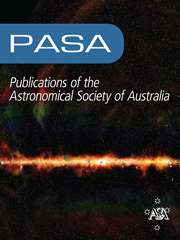Article contents
Observation Scheduling for a Network of Small-Aperture Telescopes
Published online by Cambridge University Press: 05 March 2013
Abstract
Over the past several years, a system for accepting, servicing and returning the results from a large number of imaging requests has been developed for use with automated optical telescopes. One of the primary goals of this project is to increase the accessibility of astronomy to school, college and university students. A key component of this system is a request scheduling engine, which produces schedules for each telescope for its current night. This engine is dynamic, adjusting schedules to accommodate new requests and rescheduling failed requests on a time scale of the order of ten minutes. If a telescope is unavailable for an extended period, imaging requests will be reallocated to other telescopes in the network. Various models of dynamic scheduling are considered, and the current implementation is explored with a number of numerical experiments.
Keywords
- Type
- Research Article
- Information
- Copyright
- Copyright © Astronomical Society of Australia 2007
References
- 4
- Cited by


